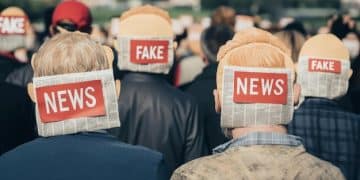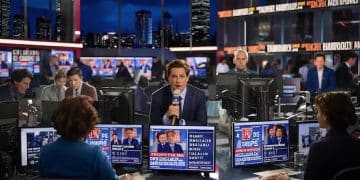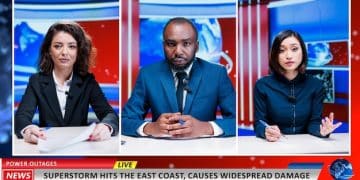Fact-Checking TV News Ownership Misinformation on Social Media

Fact Check: Debunking Misinformation Spread on Social Media About TV News Ownership involves critically analyzing claims and statements about the ownership of television news networks circulating on social media platforms to verify their accuracy and uncover any misleading or false information.
In the age of instant information, social media has become a breeding ground for misinformation, especially concerning complex topics like **Fact Check: Debunking Misinformation Spread on Social Media About TV News Ownership**. This article aims to dissect and debunk the false narratives surrounding TV news ownership, ensuring a more informed public discourse.
Why Fact-Checking TV News Ownership Matters
Understanding who owns the news sources you consume is crucial for discerning bias, identifying potential conflicts of interest, and making informed decisions. However, misinformation about TV news ownership often spreads rapidly online, clouding the reality.
The Impact of Misinformation
False claims can erode trust in media, lead to skewed public opinions, and even influence policy decisions. This is especially true when misinformation targets the core structure of news organizations, like ownership.
The Complexity of Media Ownership
Media ownership is not always straightforward. Networks can be owned by larger corporations, which in turn have diverse stakeholders. This layered structure makes it easy for misinformation to take hold if not properly investigated.
- Misinformation can promote distrust in legitimate news sources.
- It can also obscure actual power dynamics within media companies.
- It can lead to misguided activism and policy recommendations.
- Finally, it can confuse the public about the intentions and biases of different news outlets which impacts Fact Check.
Fact-checking these claims is thus not just about correcting the record; it’s about preserving the integrity of public information and ensuring informed citizenry. It helps the public identify factual information, and differentiate that from misinformation with the help of resources like Fact Check.
Common Misconceptions About TV News Ownership
Several common misconceptions consistently surface on social media regarding TV news ownership. These inaccuracies often involve oversimplified narratives or outright fabrications about who controls various networks. For example, there are multiple inaccuracies on various social media platforms regarding companies like CNN or Fox News, many of which need a Fact Check.

Myth: Single Individuals Control Major Networks
One prevalent myth is that a single individual exerts total control over a major news network. While certain figures may hold significant stakes or influence, the reality is that most networks operate under a corporate structure with multiple decision-makers.
Myth: All News Outlets Push a Unified Corporate Agenda
Another misconception is that all news outlets owned by the same corporation blindly follow a unified agenda. While there may be some editorial alignment, different outlets often maintain distinct approaches and perspectives.
Myth: Foreign Entities Secretly Control US News Networks
The internet is rife with claims that foreign entities secretly control US news networks. These claims are usually unfounded and lack credible evidence.
- Ownership is usually public and transparent.
- Networks are subject to regulatory oversight that prevents foreign control.
- Editorial independence is typically maintained even under corporate ownership.
Debunking these and other incorrect beliefs allows all to understand the actual landscape of media ownership. It allows the public to decide which news source most fits their wants and needs, and how to decide, with Fact Check as one resource to help guide the public.
How to Verify TV News Ownership Information
Verifying information about TV news ownership requires a multi-faceted approach. It involves consulting credible sources, understanding corporate structures, and critically evaluating the information presented on social media.
Utilize Official Resources
Start by consulting the official websites of the news networks themselves. Most networks provide information about their ownership structure and corporate affiliations.
Consult Regulatory Filings
Regulatory agencies like the Federal Communications Commission (FCC) maintain public records of media ownership. These filings provide detailed information about who owns broadcast licenses and related corporate entities.
Cross-Reference Multiple Sources
Never rely on a single source of information. Cross-reference claims made on social media with credible news reports, academic studies, and investigative journalism pieces.

- Check the “About Us” or “Contact” sections on network websites.
- Search FCC databases for ownership details.
- Use reputable fact-checking websites and journalism databases.
These steps can help anyone find truthful sources. With truthful information, it is possible to avoid traps of misinformation campaigns that tend to muddy the waters of what is true or not, especially with networks and outlets receiving Fact Check from various organizations.
The Role of Fact-Checking Organizations
Independent fact-checking organizations play a vital role in combating misinformation about TV news ownership. These organizations employ journalists and researchers who meticulously verify claims, assess evidence, and publish objective evaluations.
Independent Verification
Fact-checking organizations operate independently of media companies and political entities, ensuring an unbiased assessment of claims.
Assessment of Evidence
These organizations employ rigorous methodologies to assess the evidence supporting various claims. They consider the credibility of sources, the quality of data, and the logical consistency of arguments.
Public Education
Fact-checking organizations publish their findings in accessible formats, making it easy for the public to understand the truth behind complex issues like TV news ownership.
Organizations such as PolitiFact and Snopes are two platforms with a large focus on not just fact-checking, but also, disproving misinformation and helping the public to identify misleading claims. These can be used in determining if claims about Fact Check are indeed, accurate.
Examples of Debunked TV News Ownership Claims
Several high-profile cases illustrate the importance of fact-checking TV news ownership claims. These examples showcase how misinformation can take hold and the steps needed to correct the record.
Case Study: The “Soros Owns All Media” Conspiracy
One persistent conspiracy theory claims that George Soros, the billionaire philanthropist, secretly controls a vast network of media outlets. Fact-checkers have repeatedly debunked this claim, highlighting the lack of evidence and the reliance on anti-Semitic tropes.
Case Study: Claims of Foreign Government Influence
Another common claim alleges that foreign governments exert undue influence over US news networks. These claims are often based on flimsy evidence or misinterpretations of corporate ties. Fact-checkers have demonstrated that regulatory safeguards and editorial independence minimize the risk of such influence.
- These groups help counter conspiracy theories.
- They debunk claims of foreign government influence.
- They fight back against political spin and misinformation.
Studying these cases reveals patterns in how misinformation spreads and the methods used to debunk it. It can serve as a guide to anyone seeking to become more media literate and discerning. It also allows one to identify claims that need to be addressed about Fact Check.
Staying Informed and Avoiding Misinformation
In today’s digital landscape, staying informed and avoiding misinformation requires a proactive and critical mindset. By adopting certain habits and employing effective strategies, individuals can become more discerning consumers of news and information.
Cultivate Media Literacy
Media literacy involves understanding how news is produced, disseminated, and consumed. It also involves recognizing the potential for bias, manipulation, and misinformation.
Verify Before Sharing
Before sharing information on social media, take a moment to verify its accuracy. Cross-reference claims with credible sources, consult fact-checking organizations, and be wary of sensational or emotionally charged content.
Promote Critical Thinking
Encourage critical thinking among your friends, family, and online communities. Challenge assumptions, question narratives, and promote open-minded dialogue based on evidence and reason which improves the ability to Fact Check.
| Key Point | Brief Description |
|---|---|
| 🔍 Ownership Impact | Understanding ownership aids in spotting potential biases in TV news. |
| 🌐 Verify Sources | Use official sites and regulatory filings to confirm ownership. |
| 🛡️ Fact Check | Rely on fact-checking orgs to debunk false claims about ownership. |
| 🤔 Critical Thinking | Always question and verify info to avoid being misled. |
FAQ
▼
Knowing the ownership can help you understand potential biases or agendas that might influence the news coverage. It ensures you are aware of possible underlying motivations.
▼
You can usually find this information on the network’s official website, in the “About Us” section, or through regulatory filings with the FCC which discloses who owns media licenses.
▼
Information on social media can be unreliable. Always cross-reference claims with verified sources before considering them true. Social media is notorious for misinformation and spreading false claims.
▼
Yes, several organizations, like PolitiFact and Snopes, frequently fact-check claims about media ownership and influence. These will help determine validity of claims.
▼
Do not share it. Instead, share verified information from reliable sources, or report the misinformation to the social media platform if you know it is false or misleading to others.
Conclusion
In conclusion, navigating the complexities of TV news ownership requires critical thinking, media literacy, and a commitment to verifying information. Understanding who owns the networks and their potential biases is essential for making informed decisions and maintaining a well-informed public discourse. By debunking misinformation and promoting accuracy, individuals can contribute to a more transparent and trustworthy media landscape.





